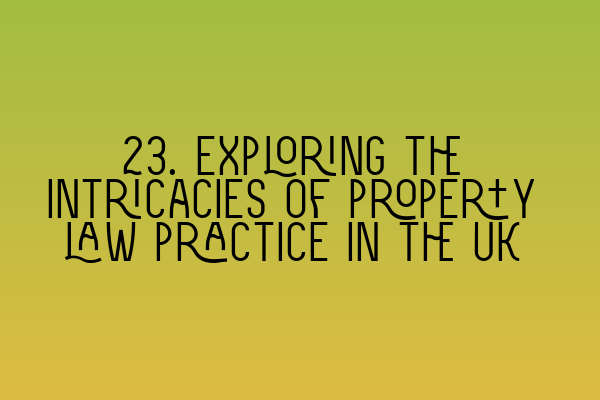Exploring the Intricacies of Property Law Practice in the UK
Property law is a vast and complex area of legal practice, encompassing a wide range of legal principles and regulations governing the ownership, use, and transfer of property. As a solicitor specializing in property law, it is crucial to have a deep understanding of these intricacies to provide comprehensive and effective legal advice to clients.
Whether you are preparing for the SQE 1 exam or already practicing as a property law solicitor, this article will delve into some of the key aspects of property law practice in the UK and provide valuable insights into this fascinating field.
1. Understanding Property Ownership
One of the fundamental concepts in property law is the different forms of property ownership. From freehold to leasehold and commonhold, each type has its own legal implications and obligations.
To succeed in property law practice, it is crucial to have a solid understanding of the various forms of property ownership and the rights and responsibilities associated with each. Understanding the complexities of leasehold enfranchisement and advising clients on the purchase or sale of leasehold properties requires a detailed knowledge of the relevant legislation, such as the Landlord and Tenant Act 1987.
2. Navigating Land Registration
Land registration is another core aspect of property law practice in the UK. The Land Registry plays a vital role in maintaining an accurate record of property ownership and interests. As a property law solicitor, you must be comfortable with conducting thorough title searches, interpreting Land Registry documents, and addressing any concerns or issues that may arise during the registration process.
Moreover, a deep understanding of the Land Registration Act 2002 is essential to advise clients on matters related to adverse possession, easements, and other rights over land.
3. Handling Residential and Commercial Conveyancing
Conveyancing is at the heart of property law practice, encompassing the legal process of transferring property ownership from one party to another. Whether you are dealing with residential or commercial property transactions, it is crucial to navigate the conveyancing process meticulously to protect your clients’ interests.
From conducting property searches and preparing contracts of sale to negotiating terms and ensuring compliance with relevant regulations and legislation, a property law solicitor must be well-versed in all aspects of the conveyancing process.
4. Resolving Property Disputes
Property disputes can arise in various scenarios, including boundary disputes, landlord-tenant conflicts, and breach of contract claims. As a property law solicitor, you will often find yourself providing advice and representing clients in these contentious matters.
To effectively resolve property disputes, a combination of negotiation skills, knowledge of relevant legislation, and familiarity with alternative dispute resolution mechanisms such as mediation or arbitration is essential. In more complex cases, litigation may be necessary, requiring a comprehensive understanding of civil procedure rules and strong advocacy skills.
5. Staying Up-to-Date with Legislative Changes
Property law is constantly evolving, with new legislation and case law shaping the legal landscape. As a property law solicitor, it is crucial to stay abreast of these changes to provide the most accurate and relevant advice to your clients.
Continuing professional development and engagement with legal resources such as books, journals, and online platforms are essential to ensure you are aware of any legislative amendments or significant cases that may impact property law practice in the UK.
Conclusion
Property law is a complex and multi-faceted area of legal practice in the UK. Whether you are preparing for the SQE 1 exam or already practicing as a property law solicitor, a deep understanding of the intricacies of property law practice is vital to providing effective legal advice.
By comprehending property ownership, navigating land registration, handling conveyancing, resolving disputes, and staying up-to-date with legislative changes, you can position yourself as a knowledgeable and proficient property law solicitor.
If you’re preparing for the SQE 1 exam, FQ Property Solicitors offers comprehensive preparation courses, including practice exam questions and mock tests. Check out our SQE 1 Practice Exam Questions and SQE 1 Practice Mocks FLK1 FLK2 resources to enhance your chances of success.
For those seeking SQE 2 preparation, our SQE 2 Preparation Courses offer comprehensive guidance to tackle the practical skills assessments effectively.
Stay informed about the latest SRA SQE exam dates and other news by visiting our SRA SQE Exam Dates page.
